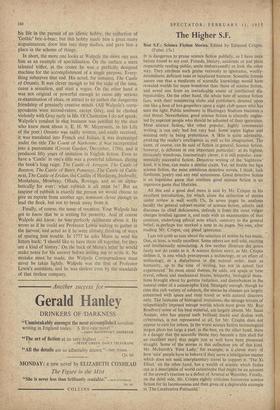BOOKS
'A Kind of History'
D0 you 'enjoy reading letters? Would you like to read 6,000 of them, all to or from the same person? If so, you have only ten years to wait. Professor W. S. Lewis has said that the massive Yale edition of the Walpole Corre- spondence, which he and his assistants began to issue in 1937, should be complete by his seventieth birthday, in 1965. If you begin at once, you will probably be just about catching up with the instalments by 1965, because here we are* at Volume 19, and each volume is a stout quarto of sonic 500 pages, with plates. The conformation of his mind was such that whatever was little seemed to him great, and whatever was great seemed to him little. Serious business was a trifle to him, and trifles were his serious business. To chat with blue stockings, to write little copies of complimentary verses on little occasions, to superintend a private press, to preserve from natural decay the perishable topics of Ranelagh and White's,, to record divorces and bets, Miss Chudleigh's absurdities and George Selwyn's good sayings, to decorate a grotesque house with pie-crust battlements, to procure rare engravings and antique chimney-boards, to match odd gauntlets, to lay out a maze of walks within five acres of ground, these were the grave employments of his long life. From these he turned to politics as to an amusement. After the labours of the print-shop and the auction-room, he un- bent his mind in the House of Commons. And, having indulged in the recreation of making laws and voting millions, he returned to more important pursuits, to researches after Queen Mary's comb, Wolsey's red hat, the pipe which Van Tromp smoked during his last sea-fight, and the spur which King William struck into the flank of Sorel. his life in the pursuit of an idiotic hobby, the collection of `Gothic' bric-k-brac; but this hobby made him a great malty acquaintances, drew him into deep studies, and gave him a place in the scheme of things.
In short, the more one looks at Walpole the more one sees him as an example of specialisation. On the surface a mere talented trifler, at the centre he was a perfectly designed machine for the accomplishment of a single purpose. Every- thing subserves that end. His novel, for instance, The Castle of Otranto. It was clever enough to hit the taste of the time, cause a sensation, and start a vogue. On the other hand it was not original, or powerful enough to cause any serious re-examination of ideas, or attract to its author the dangerous friendship of genuinely creative minds. (All Walpole's corre- spondents were second-raters, except Gray, and he clashed violently with Gray early in life. Of Chatterton I do not speak; Walpole's conduct in that business was justified by the man who knew most about it, E. H. W. Meyerstein, in his Life of the poet.) Otranto was easily written, and easily received; it was translated into French and Italian, it was dramatised under the title The Count of Narbonne, it was incorporated into a pantomime (Covent Garden, December, 1786), and it produced fifty years of imitation in English fiction. Even to have a 'Castle' in one's title was a powerful talisman, during the book's long reign; The Castle of A rt.agon, The Castle of Beeston, The Castle of BerrysPoinewy, The Castle of Caith- ness, The Castle of Eridan, the Castles of Hardayne, Inchvally, Moritabina, Mowbray, 011ada, Roviego, and so on alpha- betically for ever: what rubbish it all must be! But an inspirer of rubbish is exactly the person we would choose to give us reports from another age; someone clever enough to lead the flock, but not to' break away from it.
Finally, of course, the sense of vocation. Your Walpole has got to know that he is writing for posterity. Arid of course Walpole did know; he was perfectly deliberate about it. He wrote as if he could see Professor Lewis waiting to gather in the harvest, and acted as if he were already thinking of ways of sparing him trouble. In 1777 he asks Mann to send his letters back; 'I should like to have them all together, for they are a kind of history.' On the back of. Mann's letter he would make notes for his answer before setting out to write it. No mistake must be made; the Walpole Correspondence must never be taken lightly. Walpole was the first of Professor Lewis's assistants, and he was tireless even by the standards of that tireless company.



































 Previous page
Previous page